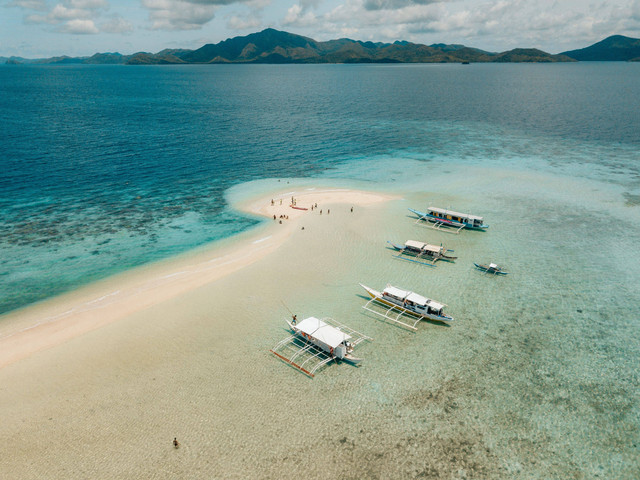Tentang KamiPedoman Media SiberKetentuan & Kebijakan PrivasiPanduan KomunitasPeringkat PenulisCara Menulis di kumparanInformasi Kerja SamaBantuanIklanKarir
2025 © PT Dynamo Media Network
Version 1.103.0
Konten dari Pengguna
Navigating the Blue Economy: Indonesia's Path to Sustainable Maritime Prosperity
29 Desember 2024 16:19 WIB
·
waktu baca 4 menitTulisan dari Alfaairo Christiano tidak mewakili pandangan dari redaksi kumparan

ADVERTISEMENT
Indonesia is an archipelagic country with a maritime area spanning 3.25 million square kilometers and a coastline of 95,181 kilometers. With such vast maritime potential, the country possesses abundant marine resources that can be optimized to support economic growth through the adoption of the blue economy concept. This concept not only leverages marine wealth but also emphasizes the importance of sustainable marine ecosystems as an integral part of economic development.
ADVERTISEMENT
According to the Coordinating Ministry for Maritime Affairs and Investment, the blue economy is a concept aimed at sustainably utilizing marine resources to drive economic growth while preserving ecosystem sustainability. The blue economy serves as an effort to maximize Indonesia's maritime territory, outlined through specific targets. As highlighted in an article by Retnosuryandari on the website of Pusat Studi Lingkungan Hidup Universitas Gadjah Mada, these targets include: (1) increasing the maritime sector's GDP contribution to 15%, aligned with the 2025-2045 National Long-Term Development Plan, (2) ensuring that maritime jobs contribute 12% of total national employment by 2045, particularly to enhance the welfare of local communities, and (3) expanding marine protected areas to 30% or 97.5 million hectares of its waters by 2045, aimed at conserving marine biodiversity, restoring fish stocks, and providing ecosystem services such as carbon absorption and the protection of valuable assets.
ADVERTISEMENT
However, achieving these targets raises several critical questions. Can Indonesia effectively implement this concept? What opportunities can be leveraged to support the blue economy, and what challenges must be addressed to ensure its success?
Opportunities for Indonesia in Implementing the Blue Economy
Indonesia has significant opportunities to capitalize on the blue economy, which can positively impact the national economy. One of the main opportunities lies in the fisheries and aquaculture sector. With abundant marine resources, Indonesia has the potential to become one of the world's leading producers of fish and seafood products. Optimizing this sector through sustainable approaches can not only boost fish harvests but also create significant export opportunities, generating foreign exchange for the country. Furthermore, the fisheries sector can directly improve the welfare of coastal communities who depend on marine resources for their livelihoods.
ADVERTISEMENT
Another opportunity is the marine tourism sector, which relies on Indonesia's natural beauty. Famous destinations such as Raja Ampat, Bunaken, and Wakatobi attract international tourists with their extraordinary appeal. With proper and sustainable management, marine tourism can increase regional income while promoting environmental conservation through integrated tourism-conservation programs. Expanding marine tourism also creates new job opportunities in the service sector and related creative industries.
Additionally, Indonesia holds a strategic advantage in maritime transportation. Located along international trade routes, Indonesian waters are crucial to global logistics. Developing maritime infrastructure such as ports, shipping lanes, and modern logistics facilities can strengthen Indonesia's role in global trade. Besides becoming a key trade hub, these initiatives can reduce regional disparities by improving inter-island connectivity.
ADVERTISEMENT
Challenges in Implementing the Blue Economy
Despite these substantial opportunities, implementing the blue economy in Indonesia faces several challenges. One of the major challenges is overfishing and marine ecosystem degradation. Overexploitation and unsustainable fishing practices have resulted in declining fish stocks and habitat destruction. Addressing this requires strengthening regulations and effective monitoring to ensure that fishing practices adhere to sustainability principles.
Another challenge is the lack of coordination in managing marine resources. Policy fragmentation between central and local governments often hampers efficient management. This issue is compounded by limited community empowerment, particularly in remote areas on the frontlines of marine resource utilization. Addressing this requires harmonized policies and programs that actively involve local communities, creating synergy between national and local interests.
ADVERTISEMENT
A significant additional challenge is the lack of infrastructure and technology in coastal and remote areas. Many regions lack adequate facilities to support fisheries, transportation, and tourism activities. To address this issue, the government and private sector need to invest in building infrastructure such as ports, seafood processing facilities, and maritime technology. Research and innovation should also be promoted to enhance efficiency and sustainability in utilizing marine resources.
By overcoming these challenges and leveraging existing opportunities, Indonesia has the potential to become a global leader in the blue economy. Implementing the right strategies will not only yield economic benefits but also ensure the sustainability of marine ecosystems for future generations.
ADVERTISEMENT

